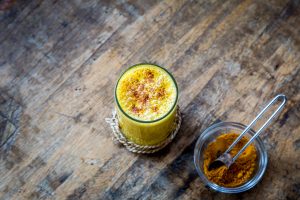Turmeric Benefits: Feeling Better Inside & Out
Turmeric is everywhere you look these days. You see it in the news and at the pharmacy. In the U.S., sales of turmeric increased a whopping 118% in 2015 and the trend continues. This yellow-orange herb indigenous to Asia has been around for millennia.
Any purveyor of Indian cuisine can attest to its long standing popularity in the culinary world and herbal medicine world. (Good luck on making a curry dish without it!) It seems to be catching on more in the west even outside of Asian restaurants and making its way into medicine cabinets. This trend’s momentum continues.
Each week I have at least one patient ask me if turmeric is worth taking. My answer every time, no matter what the ailment is is: Yes!*

Although it’s not suited for every ailment or every body (we’ll get to that shortly), turmeric is a powerful herb that has a wide application of benefits for your physical health as well as your emotional/mental health.
What Turmeric Is Good For
The component of turmeric that is typically the main focus of research studies is curcumin. Of course the higher the percent of curcumin in the turmeric, the more powerful anti-inflammatory and antioxidant properties you get. Many successful peer-reviewed research studies have focused specifically on turmeric’s benefits on arthritis and metabolic syndrome.
This superpower of herbs is akin to ginger in that in every culture that it’s grown, it’s an herb.** Herbalists in western, Chinese, and Ayurvedic traditions (only to name a few) can all attest to the amazing power of turmeric.
Pain
At its most base form, pain is a state of inflammation so any supplement or herb that is anti-inflammatory is going to help the cause. Several turmeric studies have focused on arthritis (mostly, osteoarthritis and rheumatoid arthritis) and its positive effects on managing it. Turmeric, as a Chinese herb, is in a class of herbs that is good for pain especially due to trauma. This is because it helps move blood and increase circulation to help move pain out. In Chinese herbal traditions, turmeric is especially good with reducing pain in the chest, abdomen, and flank as well as helping ease menstrual pain.
Skin
Turmeric also can help heal the skin. Dermatological concerns like chronic sores including acne and psoriasis may benefit from turmeric use. This goes back to turmeric’s anti-inflammatory and antioxidant properties.
Mental Health Concerns
Whether you’re feeling low or really hyped up, turmeric can help calm your heart and mind to relax you. Helping with concerns like anxiety, seizures, depression and mania, turmeric offers a more natural way to balance your mind and spirit.

What’s the Best Way to Take Turmeric?
Turmeric as a spice you add to food only contains a small amount of curcumin in it (usually around 3%). If you like adding it to dishes because you like the color and/or taste, feel free. To get therapeutic effects, taking a turmeric supplement is the best way. It’s also the best way to get a significantly higher percentage of curcumin in the turmeric. You can take it in capsule or pill form, or powdered form. To find out the best dose for you, please talk to your herbalist.
Is Turmeric Right For You?
Turmeric is indeed a wonder herb. However, it’s not indicated for everyone. If you are taking a blood-thinning medication or are naturally prone to bleeding; or you are pregnant, do not take turmeric. If you run cold or if you have weak digestion and get an upset stomach easily, taking turmeric with black pepper can help your body absorb it better.
All in all, turmeric is worth a try. Usually it takes about 2-3 weeks to start noticing a difference. If you want to learn more about turmeric or are thinking about trying it, please talk to your Chinese herbalist to see if it’s the right fit for you.
Got a question about turmeric (or Chinese herbs in general)? Ask Lynn here.
* Yes, but see the cautions and contraindications with women who are pregnant and people taking blood-thinning medications.
** Interestingly, turmeric is a cousin of the ginger family.
Sources: Curcumin: A Review of Its’ Effects on Human Health, https://www.ncbi.nlm.nih.gov/ pmc/articles/PMC5664031/
Bensky, Dan et al. Materia Medica 2nd Ed.

About Author
Lynn Palmgren helps people get rid of pain and balance hormones so they can feel good again. She specializes in acupuncture and cupping for pain management, insomnia, hormone imbalance, and stress relief. She is a licensed acupuncturist and Chinese herbalist and co-owns Palmgren Acupuncture in Oak Park, Illinois. You can find Lynn at Google+ and Instagram.
Articles You Might Like
Why Cinnamon Is Awesome
Pain Relief: 3 Tips to Try at Home
Eastern and Western Medicine Approve of This Natural Remedy for Depression

